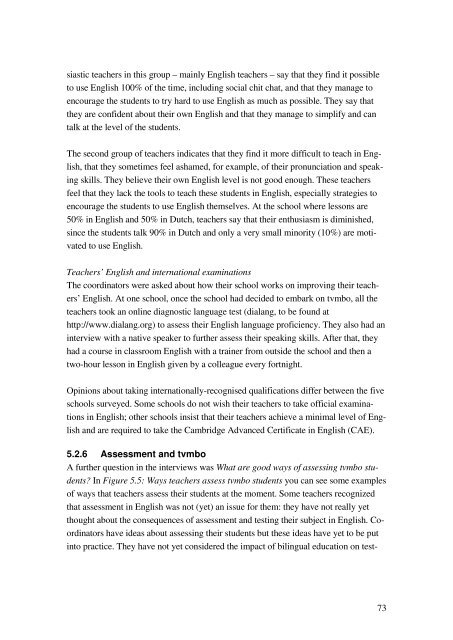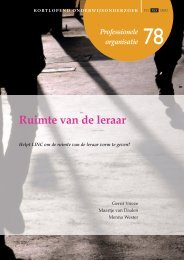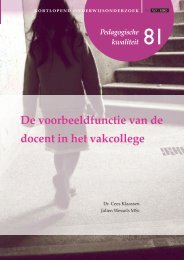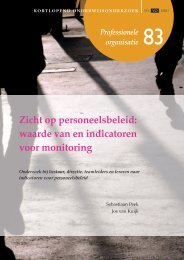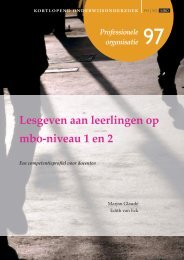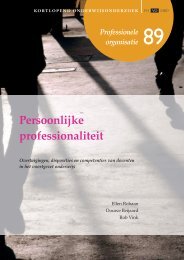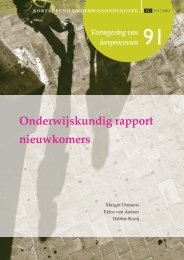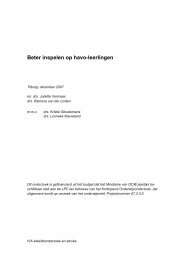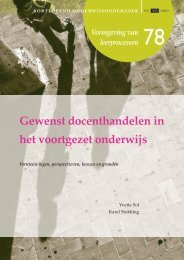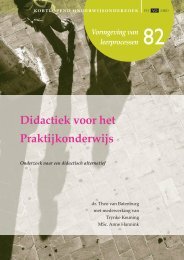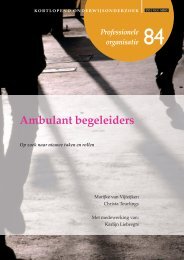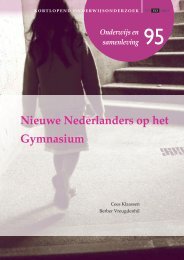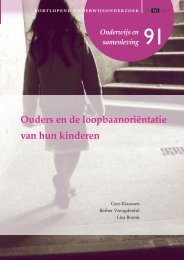Proud to be tvmbo - Kortlopend Onderwijsonderzoek
Proud to be tvmbo - Kortlopend Onderwijsonderzoek
Proud to be tvmbo - Kortlopend Onderwijsonderzoek
Create successful ePaper yourself
Turn your PDF publications into a flip-book with our unique Google optimized e-Paper software.
siastic teachers in this group – mainly English teachers – say that they find it possible<br />
<strong>to</strong> use English 100% of the time, including social chit chat, and that they manage <strong>to</strong><br />
encourage the students <strong>to</strong> try hard <strong>to</strong> use English as much as possible. They say that<br />
they are confident about their own English and that they manage <strong>to</strong> simplify and can<br />
talk at the level of the students.<br />
The second group of teachers indicates that they find it more difficult <strong>to</strong> teach in English,<br />
that they sometimes feel ashamed, for example, of their pronunciation and speaking<br />
skills. They <strong>be</strong>lieve their own English level is not good enough. These teachers<br />
feel that they lack the <strong>to</strong>ols <strong>to</strong> teach these students in English, especially strategies <strong>to</strong><br />
encourage the students <strong>to</strong> use English themselves. At the school where lessons are<br />
50% in English and 50% in Dutch, teachers say that their enthusiasm is diminished,<br />
since the students talk 90% in Dutch and only a very small minority (10%) are motivated<br />
<strong>to</strong> use English.<br />
Teachers’ English and international examinations<br />
The coordina<strong>to</strong>rs were asked about how their school works on improving their teachers’<br />
English. At one school, once the school had decided <strong>to</strong> embark on <strong>tvmbo</strong>, all the<br />
teachers <strong>to</strong>ok an online diagnostic language test (dialang, <strong>to</strong> <strong>be</strong> found at<br />
http://www.dialang.org) <strong>to</strong> assess their English language proficiency. They also had an<br />
interview with a native speaker <strong>to</strong> further assess their speaking skills. After that, they<br />
had a course in classroom English with a trainer from outside the school and then a<br />
two-hour lesson in English given by a colleague every fortnight.<br />
Opinions about taking internationally-recognised qualifications differ <strong>be</strong>tween the five<br />
schools surveyed. Some schools do not wish their teachers <strong>to</strong> take official examinations<br />
in English; other schools insist that their teachers achieve a minimal level of English<br />
and are required <strong>to</strong> take the Cambridge Advanced Certificate in English (CAE).<br />
5.2.6 Assessment and <strong>tvmbo</strong><br />
A further question in the interviews was What are good ways of assessing <strong>tvmbo</strong> students?<br />
In Figure 5.5: Ways teachers assess <strong>tvmbo</strong> students you can see some examples<br />
of ways that teachers assess their students at the moment. Some teachers recognized<br />
that assessment in English was not (yet) an issue for them: they have not really yet<br />
thought about the consequences of assessment and testing their subject in English. Coordina<strong>to</strong>rs<br />
have ideas about assessing their students but these ideas have yet <strong>to</strong> <strong>be</strong> put<br />
in<strong>to</strong> practice. They have not yet considered the impact of bilingual education on test-<br />
73


